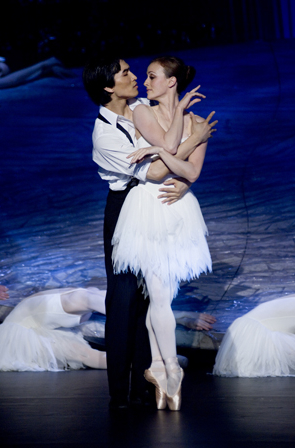By Joe Bendel. The Chinese government is very protective of its international image. That is why it is so remarkable Bruce Beresford’s Mao’s Last Dancer was allowed to film there. [LFM Co-Editor Govindini Murty has covered Mao’s Last Dancer previously in-depth here.] Evidently, the government “suggested” some revisions to the script once shooting was underway, but according to the press notes, the Australian director categorically disregarded them, even though it jeopardized the entire production. The centerpiece film of the upcoming Asian American International Film Festival, Dancer is one of several selections that will interest China watchers when the fest kicks off tomorrow night in New York.
Full reviews of Dancer are embargoed until the week of its theatrical release, but expect to hear terms like “crowd pleasing” after its festival screening this Saturday. The story of ballet dancer Cunxin Li’s defection to America, Dancer depicts the Cultural Revolution as a period when art was debased by ideology. Madame Mao herself makes an appearance, despite “requests” to the contrary from the Chinese government. Offering plenty to discuss, look forward to a proper review of Beresford’s film here at Libertas in the near future.

Ballet also figures tangentially in Taipei 24H, an anthology film commissioned by Taiwanese Public Television that captures vignettes of life throughout the capitol city during one average but eventful day. Appropriately, 24H saves its deepest and most accomplished film for last—4:00 AM to be exact.
Featuring renowned Taiwanese auteur Tsai Ming-liang, directed – in a reversal of roles – by his cinematic alter-ego, actor Kang-sheng Lee, Remembrance is deceptively simple. Having sold her business, the proprietress of a late night coffee shop is joined by a regular customer for a final cup of java and to watch a documentary on Luo Man-fei, a Taiwanese ballerina who died of lung cancer – but whose celebrated performance of choreography, shaped by the experiences of Tiananmen Square survivors, still has the power to move the night owls decades later. Brief but elegant, Remembrance celebrates quiet moments of beauty, and those who inspire them.
Once, rural peasants represented an ideologically privileged class in China. Today, they mostly lead hardscrabble lives of strife and want, particularly when compared to urban professionals. It is an iniquity frequently captured by the Digital-Generation of independent Chinese directors, as well as two American-based filmmakers whose stylistically compatible shorts set in China will also screen during AAIFF ‘10.
D-Generation documentaries represent with scrupulous accuracy the living conditions of the unfortunates who exist on the margins of Chinese society. However, their length and studiously languid aesthetics can try the patience of some audiences. In contrast, Tani Ikeda’s documentary short Turn of the Harvest is a manageable twelve minutes, but still gives viewers an honest, tactile sense of its subjects’ lives.
A late middle-aged couple works their wheat field, quietly joking between themselves. The man has a broken finger he has not treated for three weeks. Yet, outwardly they seem happy. However, as Ikeda interviews his wife, it becomes clear their relationship is not all it might appear. Especially painful for her was a decision to relinquish one of the twins she gave birth to, out of economic necessity. Surprisingly, they choose to give up their son, because boys cost more to raise.

Of course, boys tend to be preferred over girls, which accounts for the looming shortage of marriageable women under China’s restrictive family planning. Take for instance the family of fourteen year year-old Maple in Chloé Zhao’s narrative short Daughters. With a coveted baby boy on the way, her parents suddenly have one daughter too many. Coldly pragmatic, they see only two options. Either they foist off her sweet tempered young sister on a distant family member, or they arrange her marriage to a disturbingly old man. Not surprisingly, such news causes confusion and resentment for the preteen.
Daughters is nine minutes of focused heartbreak, featuring a devastating performance from young Luo Qian as Maple. Though brief, it is undeniably assured filmmaking, all the more impressive considering it was the NYU alumnus’ second year film.
AAIFF’s centerpiece, Dancer, screens this Saturday (7/17), in advance of its late August opening. Well worth seeing for Remembrance alone, Taipei 23H screens on Sunday (7/18). Daughters screens as part of AAIFF’s Oh Family, Where Art Thou? block of shorts this Sunday, while Harvest screens the next day as part of the Untold Stories shorts program.
Posted on July 15th, 2010 at 11:16am.
mld looks awesome. can’t wait to see it.
I’m really surprised that they allowed this to be filmed in China without censorship. Didn’t the Chinese censor a far less political film like “The Karate Kid”?
The plight of women in China is too little talked about. The Communist government’s “One Child” policy has meant that millions of baby girls are killed or abandoned so that the family can have their one baby boy. The result is there now is a vast population imbalance with far more boys than girls. That is the hideous effect of that country’s socialist policies, and that is the sort of social engineering that the left would like to bring here.
I’m hoping “Mao’s Last Dancer” comes to pay-per-view because I think that’s the only way I’ll be seeing it any time soon.